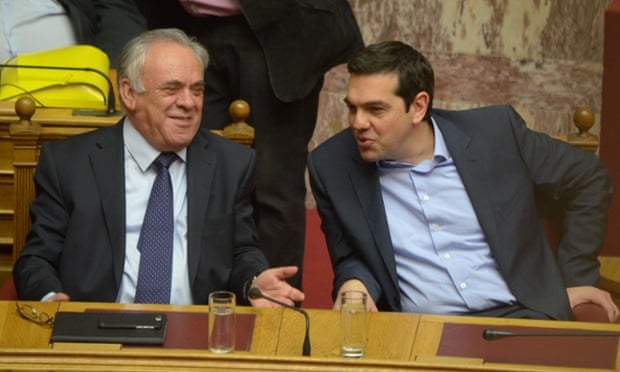Helena Smith in Athens Monday 27 April 2015
Yanis Varoufakis quotes Franklin D Roosevelt in a statement that seems to confirm he received a dressing-down from Eurozone ministers on Friday
Yanis Varoufakis, centre, and other ministers at the Eurozone meeting in Riga, Latvia, on Friday. Photograph: Dmitris Sulzics/AP

The gulf between Greece and its creditors widened yet further on Sunday with the crisis-hit country’s finance minister brazenly tweeting that he has become a target of hate.
Upping the ante in what has increasingly become a war of nerves, Yanis Varoufakis took on his opponents by making use of one of Franklin D Roosevelt’s most memorable lines. “FDR, 1936: ‘they are unanimous in their hate for me; and I welcome their hatred’. A quotation close to my heart (& reality) these days,” he wrote.
The intervention appeared to confirm reports that Varoufakis had received an excoriating dressing-down from exasperated Eurozone counterparts in Riga on Friday. One participant felt fit to describe the celebrity finance minister as “a time-waster, a gambler and an amateur”.
Highlighting just how strained relations have become, the anti-austerity politician stayed away from an official dinner following the euro group – the latest in a litany of missed deadlines to reach a cash-for-reform deal to keep the loan-dependent country afloat.
The increasingly ugly game of brinkmanship intensified as prime minister Alexis Tsipras’s radical-left Syriza coalition – elected on a pledge to end the painful cuts enforced on Athens in return for aid – warned of the risk of default if creditors continued to “asphyxiate” Greece by starving it of liquidity.
“We aren’t bluffing,” Syriza’s parliamentary spokesman Nikos Filis insisted at the weekend. “In July and August we have to pay a lot. We won’t be able to pay €20bn without having been financed.”
Attributing the deadlock in negotiations to the determination of lenders not to see other anti-austerity parties rise in Europe, he added: “The issue is essentially political. It’s not only limited to an economic negotiation. They don’t want the new Greek government, it doesn’t suit them. They’ve said it openly.”
Greek prime minister Alexis Tsipras (right) talks to DPM Yannis Dragasakis, who said Athens might be forced ‘to take measures that until now we have tried to avoid’. Photograph: Giorgos Panagakis/Demotix/Corbis
Earlier, the country’s deputy prime minister Yannis Dragasakis said Athens might be forced “to take measures that until now we have tried to avoid” if the political uncertainty continued.
With cash reserves running out fast and bankruptcy looming, the government has raised the spectre of electing to pay public sector pensions and salaries over debt repayments to the International Monetary Fund and European Central Bank.
“There is clearly an imperative need for an interim agreement to be concluded in the first days of May, if not within April,” Dragasakis, who heads the administration’s economic policy, told Avgi newspaper, Syriza’s mouthpiece.
“We are mainly requesting that the current liquidity problem be recognised as a problem of common responsibility and that it be jointly addressed.”
The Greek government may want to take [negotiations] to the wire, but does it know where the wire is?
The three-month-old coalition has frequently blamed the ECB for cutting off the Greek economy’s oxygen by forcing the country’s banks to survive on weekly handouts of emergency assistance, and limiting their lending to the state.
Greece has been given until the next meeting of Eurozone finance ministers on 11 May to deliver a comprehensive package of reforms to unlock €7.2bn in short-term aid held over since last summer. The government has repeatedly said it wants a deal but has adamantly refused to cross “red lines” that would further scale back pensions, trim workers’ rights and pave the way to privatisations opposed by far-left factions in Syriza.
“There is a great sense of urgency for all of us. Time is running out,” the euro group chairman Jeroen Dijsselbloem said after Friday’s meeting. “But there is a great determination among our Greek colleagues.”
Reflecting on the strained relations, the defence minister Panos Kammenos, who heads Anel, the coalition’s junior right-wing partner, did not rule out a referendum being called if a deal wasn’t concluded and there was rupture with Europe. “In the event that they try to enforce an informal exit on us, a plebiscite could happen,” he told Mega TV. “Wolfgang Schäuble has a very hostile stance towards our country,” he said of the German finance minster, who hinted on Saturday that Europe had prepared contingency plans to deal with a possible Greek exit from the Eurozone. “He [treats] Europe as if it is his own shop. If Mr Schäuble’s views are imposed there will not be a solution.”

What happens if Greece can’t pay its debts?
The standoff between a left-wing government and the financial powers of the EU is near to breaking point. What if the worst happens?
While the vast majority of Greeks agree that austerity is self-defeating, there is a growing sense that the gridlock in talks is also counter-productive. Tensions with lenders have spurred a mini-run on Greek banks, with the real economy coming to a standstill. A Kapa research poll published in the Sunday Vima newspaper showed that 72% wanted the country to strike a deal with creditors, versus 23% who were in favour of a clash.
“The Greek government may want to take [negotiations] to the wire, but does it know where the wire is?” said a senior EU official.
“It is playing with fire. With no endgame in sight, of course the EU has contingency plans. It would be derelict of it not to.”
In the absence of progress, the Greek prime minister has turned personally to the woman who was once his greatest rival, the German chancellor Angela Merkel, for help. Shifting his attention from Brussels, Tsipras has placed hope in a political solution ultimately being sealed with Berlin, the provider of the bulk of Greece’s €240bn bailout programme.
![The [Greek] European Tragedy](https://blogger.googleusercontent.com/img/b/R29vZ2xl/AVvXsEiWKI5s90SFm1wWTk6bs4p7CgslaC2SnYPsrZhb-B-smOufNNCSxCvpBLI9hOB-LsXZjir_PNmEiMk2-E62F3xkg96IoC6QFAaZAnPRTVH340IN9WBRmWJqPkjWlgyRj3zpALp7h6hvA58/s920/GkBack_new.jpg)
